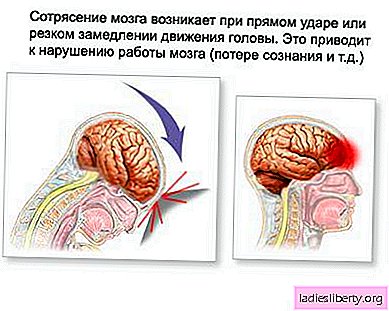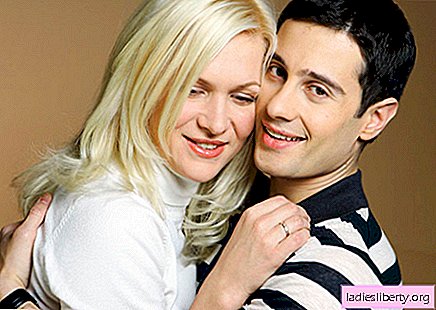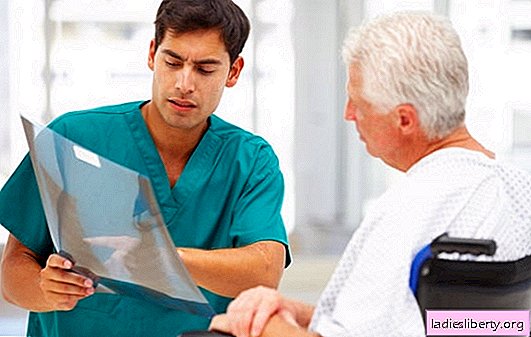
Concussion called a short-term violation of its functions due to a head injury in which the brain itself does not receive physical damage. With regard to its development, doctors today do not have complete clarity, however, it is generally accepted that it manifests itself as a result of a breakdown in the connections between nerve cells, mainly functional ones. Among traumatic brain injuries, concussion is the most common condition.
Concussion - Causes
Concussion can be caused by bruises (focal), strokes, and some sudden movements. Most often, it occurs during traffic accidents; with domestic, industrial and sports injuries; under criminal circumstances.
Concussion - Symptoms
Concussion can occur with a single vomiting, rapid breathing, rapid or slow heart rate, which quickly normalizes. Blood pressure can also change and quickly return to normal, however, sometimes it can remain elevated for a long time, as concussion is usually accompanied by stress factors. A change in body temperature is not characteristic of concussion.
After regaining consciousness, a concussion can be suspected of headache, dizziness, weakness, tinnitus, flushing, sweating, discomfort and sleep disturbance. It also manifests itself with pain when moving the eyes, diverging eyeballs when trying to read. Improvement in the general condition of the victims usually occurs within one to two weeks after the injury.
Concussion - Diagnosis
Information on the circumstances of the injury is of great importance for the diagnosis of concussion. If a concussion is suspected, an x-ray of the cervical spine and skull is performed to exclude fractures and cracks in the skull and displacement of the cervical vertebrae. This is important, because with such an injury, you need to make sure that it is closed in order to prevent brain hemorrhage and stroke.
Encephalography and echoencephaloscopy are mandatory to make sure that there are no hidden lesions with the vessels of the brain.
In severe injuries, computed tomography is prescribed to conduct a complete examination of the brain.
An examination of the fundus is also carried out, during which the optometrist examines the state of the vessels and the optic nerve head to exclude hemorrhages and lamellar hematoma.
Concussion - treatment and prevention
No matter how easy the injury may seem, if a concussion is suspected, the victim should be immediately taken to hospital to clarify the diagnosis by X-ray and other examinations using special equipment.
In the acute period, victims are treated in the neurosurgical department. Mandatory is bed rest for 5 days. With a favorable clinical course and the absence of complications, the patient is in the hospital for 7 to 10 days, then outpatient treatment is carried out for 2 weeks.
The goal of drug treatment for concussion is to normalize its functional processes and relieve symptoms such as headache, dizziness, anxiety, and insomnia. As a rule, this is achieved by the appointment of analgesics, sedatives and sleeping pills.
Along with this, course vascular and metabolic therapy is often carried out, which allows faster restoration of impaired brain functions.
Multivitamins and tonic drugs are also prescribed.
The main prevention of concussion is:
- the use of a protective headgear (helmet) when practicing certain sports (martial arts, football, hockey, roller-skating, cycling, etc.);
- use of seat belts in cars;
- elimination of dangerous household factors (faulty furniture, spilled liquids on the floor, cluttered walkways and corridors, etc.).











